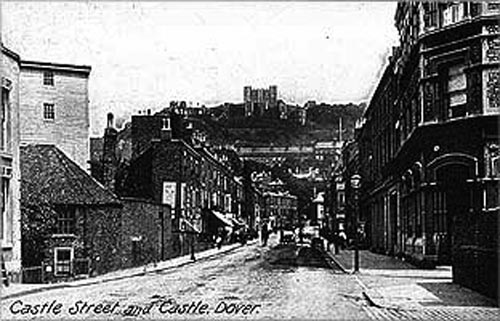Ancient Mills
Over the centuries, thirteen mills have been powered by the river Dour. Eight of the Dour's mills were corn mills, with the site at Charton also being used as an oil mill. The remaining five mills were paper mills, which needed the Dour's pure water for manufacture processes as well as power.
• Find out more about paper mills on the Dour
A number of mills on the Dour were recorded in the Domesday Book, a record made by the Normans, in 1086AD, of all taxable land and property following their conquest of England in 1066AD. From the Dour's source heading downstream, "Domesday mills" included Kearsney Court mill in Temple Ewell, Crabble corn mill, Lower Buckland Mill and Charlton Flour Mill, Other ancient mills were recorded in at Brox-Ditch Meadow, today the area around Lorne Road and Alfred Road, and at Charlton. Priory Mill, sanctioned by the church, was listed in the Domesday Book, together a description of a tide mill connected with the Priory that was already demolished before the Norman conquest. This may have been due to the damage it was said to have casued to shipping. Historians and archealogists have long debated about its exact position. The Town Flour mill, near Dolphin Passage and close to the modern seafront, was also recorded in the Domesday Book but was not as old as those upstream , having only been built since the Norman Conquest by Herbert, Son of Ivo.

Military Suppliers
Temple Ewell Mill was built by St John's Commandery to supply its troops. In 1798 it was bought by the Pilcher family to help to supply Napoleanic troops.
Maison Dieu Mill, on the site of the bridge behind Maison Dieu House (the Town Council Offices) was built by John Payntour in 1540 to provide flour to Victualling Store in the Maison Dieu (Dover Town Hall)which supplied food and drink to the Navy. In 1590 two mills at the site are recorded - one for wheat and one for malt, which would have supplied the brewery in the Maison Dieu. The Maison Dieu mills dissapear from the records in the 1700s.
Napoleonic Demand
The Napoleonic wars from 1803 - 1815 made milling a very profitable business in Dover. Feeding the vast numbers of troops stationed in the town required greatly increased production of flour and the maison Dieu was used to bake bread for the soldiers. Stembrook Mill was built in 1799 by the Royal Navy to help to mill enough flour. Today the site is occupied by a carpet shop on the corner of Castle Street and Stembrook. It was probably built on the site of a mill known to be there in the 1780s, and may have been rebuilt again in 1813. The river now runs into a culvert at this point and the former location of the mill can be seen by railings over the culvert entrance.
Fortunes made and lost
The opportunity for quick profits during the Napoeonic Wars led several milling families to take out substantial bank loans to begin or expand their businesses. Following victory at Waterloo, the end of demand for military supplies and an unstable national economy made times very hard for Dover's miilers. iliam Kingsford bought Bucklamd Corn Mill in 1814 and built the fine Lundy House next door. He expanded his business by buyong Charlton Mill around 1820, but tried to sell it again withing the decade, finally selling it to Joseph Bell. Despite considerable modernisation of the mill, Bell had little sucess with it. Kingston purchased Maison Dieu Hoause in 1833, but must have been overconfident of his sucess as he was declared bankrupt the same year. Unreliable harvests in the late 1830s, coupled with a ban on imported grain and the collapse of a Dover bank all played their part in the ruin of the Pilcher family, who had previously been the sucessfull ownner and managers of several of Dover's mills. Their demise was the making of the Mannering and Stanley families. The Mannerings bought the Picher's former mill at Crabble from the Fector bank, beginning a successful milling business that continued through the generations until their last mill, Buckland mill, ceased operations in 1957. The Pilcher's Temple Ewell mill was first bought from the bank by Mr Martin, who became bankrupt. Alfred Stanley, already running a sucessful mill at Keasney, then bought it for £100, later building a second steam mill to the Kersney Mill specifications on the opposite Side of the Road. The Stanley family moved all of their business to Temple Ewell and retained ownership of the mills, The Temple Ewell mill steam was the last mill on the Dour to cease commercial trading in 1967, and is now the Dover Operatic and Dramatic Societies costume store. The watermill opposite was partly demolished, loosing some of its buldings and mill wheel cover, but still stands as a private house. Today only the restored Crabble Corn Mill, now owned by a trust, still grinds corn on the Dour.
